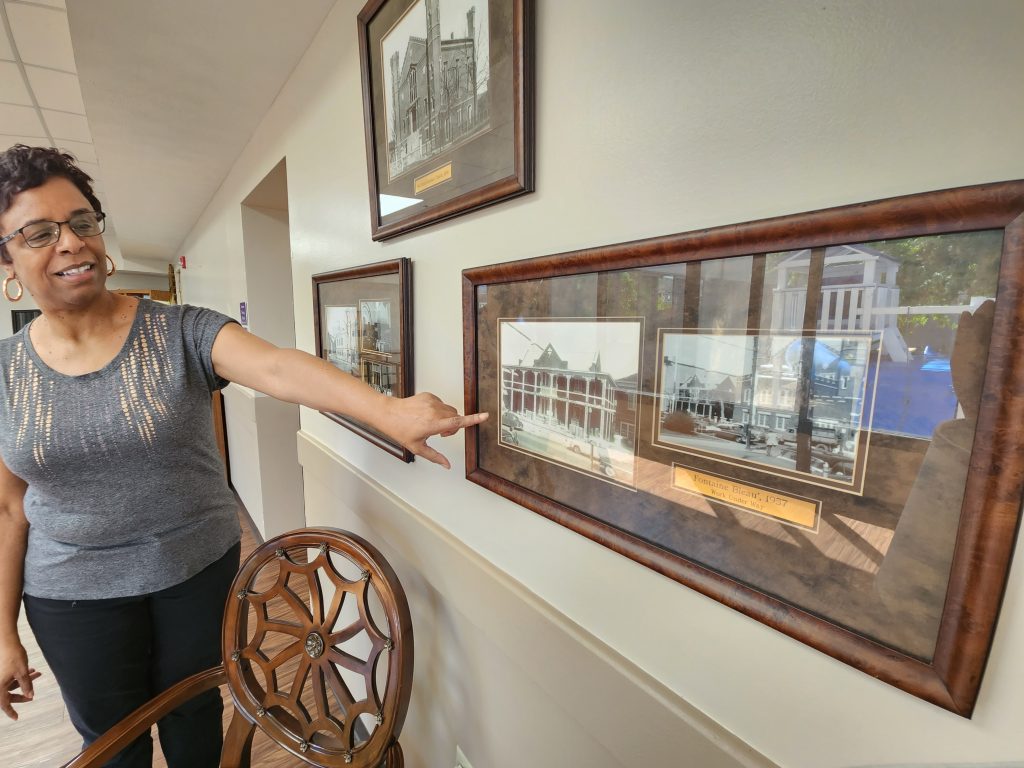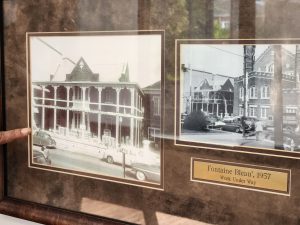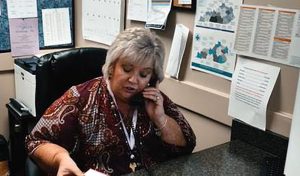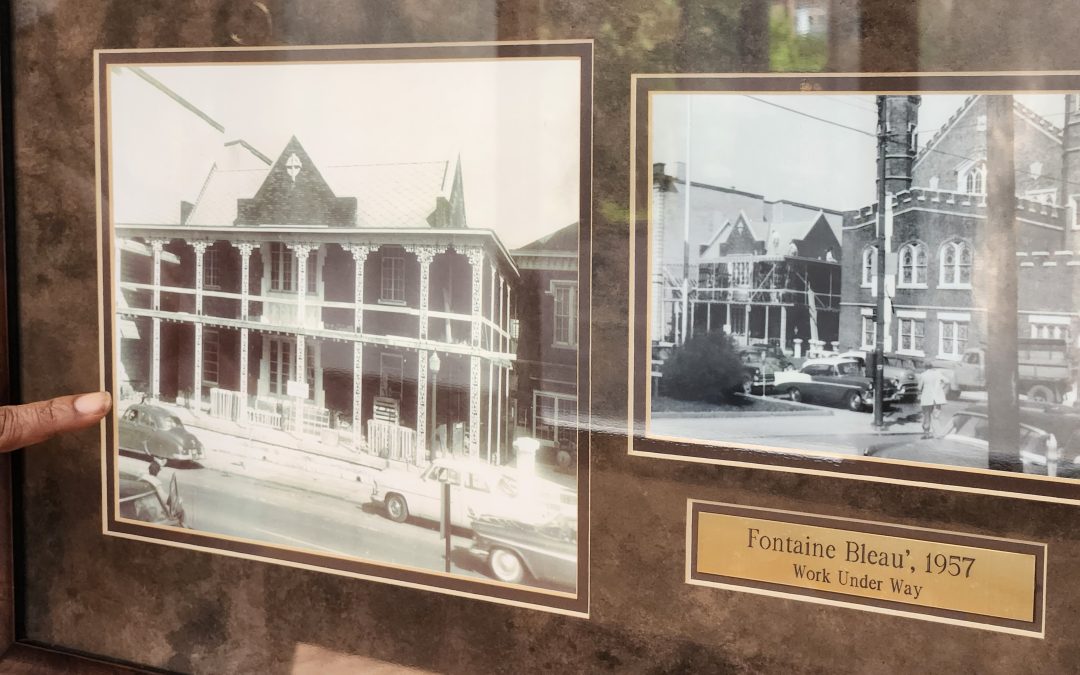
Retired staff Tanya Boyd points to a historical photo inside Sanctuary.
A cross still hangs above the edifice that was once the education building of the Christian Church in the 1930s. Since then, the building has seen many iterations — becoming a wing of a high-end motel in the 1950s and the eventual home of Sanctuary, Inc. in the late-1990s.
As the nonprofit shelter for domestic violence and sexual assault survivors considers its next location, longtime staff look back at where Sanctuary began and where it is going.
“This building has had so many lives,” said retired Sanctuary employee Tanya Boyd.
Boyd started at Sanctuary in 1989. She was hired as a job counselor, but she was also the employee who scouted the price of Sanctuary’s current location.
“(The director at the time) told me to ask the man what he wanted for it,” Boyd recalled, and although she doesn’t remember the asking price, she remembers the process of making it Sanctuary’s home.

The photo reveals that Sanctuary’s current building contains architecture from the 1800s.
“Most people remember it as the Fontaine Bleau’, but before that, it was a church — it has this façade almost like the sanctuary was right here.”
Prior to moving into its current location, Sanctuary, Inc. was in an unassuming house where the Christian County Justice Center now stands, noted retired Sanctuary employee Anita Hall.
“It was just a little house,” she said. “The administrator’s office was on the corner of Seventh Street, and we also had a rape crisis center downtown.”
Hall started at Sanctuary in 1997 after earning a bachelor’s degree in social work: “I knew I didn’t want to be a social worker, but the education part really excited me,” she said.
Hall was hired in a dual role as an educator and a court advocate. Day to day, she traveled to schools across the nine-county Pennyrile region to educate students from kindergarten to college-age about keeping yourself safe from sexual abuse, date rape and other forms of interpersonal violence. On other days, she tag-teamed court with another advocate, standing alongside victims as they faced their abusers in front of a judge.
Helen Kenton was executive director of Sanctuary at the time, and Myra Starkey was education coordinator and Hall’s direct supervisor.
“Myra had a good relationship with all the schools, so we were able to get into most of the schools in our counties,” Hall said. “They were very welcoming. Sometimes we would get phone calls from parents about a booklet the kids came home with, but once we explained our work, they were appreciative.”
Sanctuary continues to educate students of all ages, with current educator Kenyata Simmons leading the Green Dot workshop and community programs.
Before opening its first emergency shelter in 1984, Sanctuary was formed out of a grassroots concern about the far-reaching societal impact of domestic violence, according to the agency website. The original goal was to educate the public about domestic violence and to offer victims a comprehensive range of services.
In December 1982, a walk-in counseling center for spouse abuse victims was established in Madisonville offering 24-hour crisis counseling, individual counseling, court advocacy for victims, information and referral services, and a speaker’s bureau for increased public education.
A 12-bed residential shelter was established in Hopkinsville in 1984. The shelter provided temporary lodging for abused women and their children in a safe, secure environment. Today, Sanctuary has 24 beds for emergency shelter along with transitional apartments.
In partnership with two local landlords, Sanctuary now provides two off-site housing units for families who are ready to transition into a more independent living setting.
Public education in schools and civic groups came in 1987, along with other non-residential services such as a support group for survivors and legal advocacy in district court.
In 1989, Sanctuary became a multi-purpose agency with the advent of a job-training program for homeless victims of domestic violence. Boyd started as a job counselor that October.
“I had done work with the (Job Training Partnership Act) to help youth find jobs,” Boyd said. “When I saw an opening to get a job here, I didn’t even know what Sanctuary was, but I knew the position was something I had been doing.”
Boyd became coordinator of a job program for residential and non-residential clients. Part of her job also included meeting with families.
“The only thing that was different coming here from the school system was dealing with people who were residential,” she said. “It was a humbling experience working in a residential survivor shelter. It was a learning experience.”
Boyd noted that Sanctuary’s shelter was just 10 years behind the first domestic violence shelter opening in Louisville.
“They were some innovative people going from three hots and a cot to an actual domestic violence program,” she said.
Directors often spent time in Frankfort lobbying for laws that did more to protect victims and hold abusers accountable. Boyd remembers when emergency protective orders became a Kentucky Revised Statute.
“Once that was done, we went to court all over — Lyon County, Trigg County, Todd — I’ve been a little bit of everywhere,” Boyd continued. “By us having a presence there, that was good for Sanctuary.”
Both Boyd and Hall said working with law enforcement and the courts has been an ever-evolving relationship. Sanctuary advocates have hosted trainings with agencies to educate them about their role in victims’ relations.
“One thing we did was let people know that we’re not here to be attorneys,” Boyd said. “Once we communicated that we were here as support, people were comfortable with us.”
Hall said in her 24 years at Sanctuary, community awareness and support increased along with their reach to victims.
“I think DV and SA have always been there, but it’s not as taboo to talk about now, so we hear about it more often,” she said. “It may seem like our numbers are going up, but abuse has always been there.”
Sanctuary, Inc. is open 24/7, 365 days a year. Advocates and part-time staff work in shifts to man the crisis hotline, which links victims to a trained advocate at any hour of the day.

Longtime employee Lesley works the crisis hotline, which is staffed 24/7, 365 with victims advocates ready to take calls from those in need of emergency shelter.
“We’re like the post office and Waffle House, no matter the weather, we’re still open,” Hall said.
Grants help Sanctuary provide services such as therapy, rehousing stipends, job placement and more. Donations from the community provide clothes, shoes, personal care items and even volunteers.
“There have been numerous meetings and conversations, with the board and community leaders, concerning the future of Sanctuary’s next location,” said Heather Lancaster, executive director. “As of recent, we’ve received lots of support for Sanctuary’s vision to relocate, and we look forward to finding the right land and building design most conducive to privacy and safety of clients and staff.”
In recent years, Lancaster and staff have seen an increase in safety concerns due to the shelter’s central location.
The Sanctuary, Inc. Board of Directors recently voted to list the building for sale while scouting its new home. An architect was also hired to design a structure specifically for Sanctuary’s services.
“While the current location has served the agency well, we look forward to the opportunities that a new location will provide,” said board chair Jordan Talley. “The team at Sanctuary is passionate about their work and always looking to grow and improve the ways in which they serve victims. This time of transition is no different.
“Building upon confidentiality and enhancing safety will be paramount,” Talley continued. “We will keep our eyes toward the future and the possibilities of new and improved avenues for healing and recovery for everyone impacted by domestic violence and sexual assault in our communities.”
Until a new location is determined, Sanctuary will continue providing shelter and services to those fleeing abuse.
Hall said she hopes that one day there will be no need for a place like Sanctuary.
“I do understand that’s probably not realistic,” she said. “I love the idea of Sanctuary being a one-stop shop for services — now that the SAFE room is there is amazing. We talked about that years ago and never thought we’d see it.”
In April, Sanctuary opened its S.A.F.E. Room to offer free sexual assault forensics exams in a more confidential setting than an emergency room. Trained sexual assault nurse examiners and victims’ advocates are just a phone call away.
Boyd – who now works as a part-time staff trainer and serves on the agency’s facilities committee – said the teamwork that keeps Sanctuary running should be commended.
“We never missed a beat during COVID,” Boyd said. “Heather gets so many props. We took services that were outreach and we used technology. People cooked; they worked different shifts. COVID brought out our resiliency.”
Looking to the future, both retirees said they can’t wait to see Sanctuary’s next phase.
“I would love to see a new location that has just belonged to us — built and designed for us,” Boyd said. “There’s a whole mindset in architecture that is built for domestic violence shelters — safety, accessibility for residents and also staff. Your environment has so much power over what you can do and how you feel about the work.”
As far as the clients, Hall said she hopes they leave with a sense of feeling “safe and heard, and that if they feel like if they have to come back, that it’s no judgment. I hope they take a host of information with them that they could see the red flags.”
There is no limit on how many times a client can return to Sanctuary. According to the National Domestic Violence Hotline, it can take victims up to seven times to leave their abuser.
“We used to call it planting seeds for change,” Hall said. “I think that’s what we do at Sanctuary: We plant those seeds, and we hope they take those seeds and flourish.”

